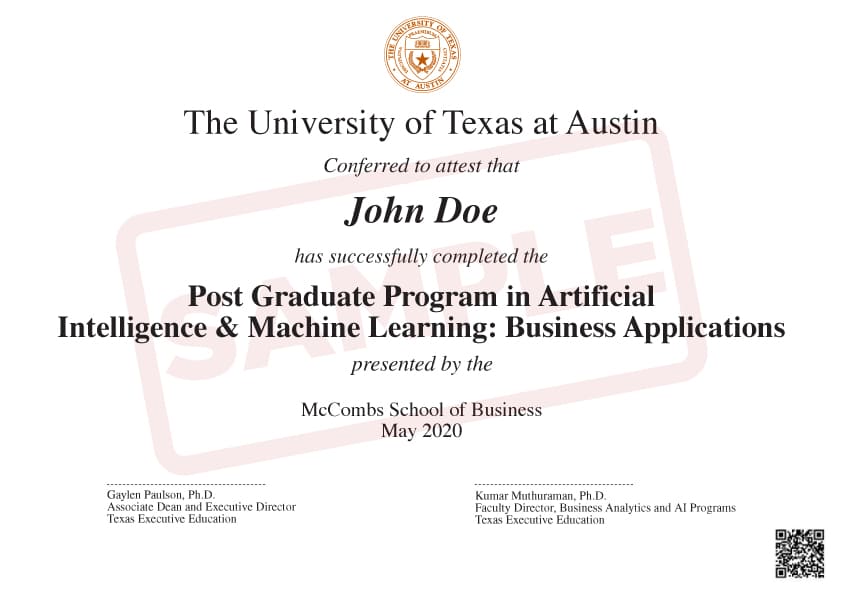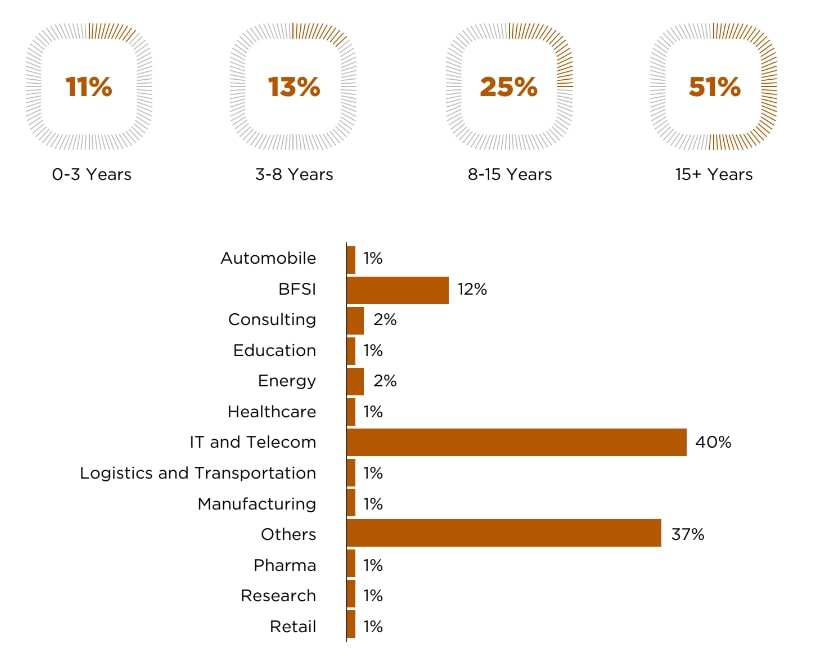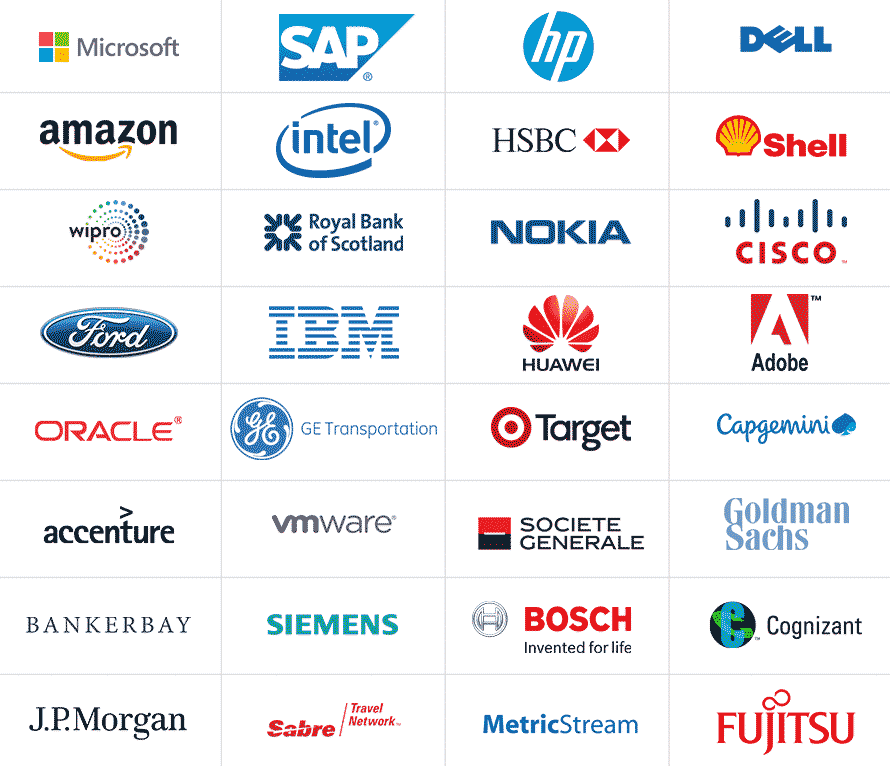Learn more about the course
Get details on syllabus, projects, tools, and more

PGP in Artificial Intelligence & Machine Learning: Business Applications
Master AI applications and secure a future-ready career
Application closes 18th Dec 2025

Program Outcomes
Elevate your career with advanced AI skills
Become an AI & Machine Learning expert
-
Lead AI innovation by mastering core AI & ML concepts & technologies
-
Build AI applications with GenAI, NLP, computer vision, predictive analytics, and recommendation systems
-
Build an impressive, industry-ready portfolio with hands-on projects.
-
Earn a bonus certificate in Python Foundations to strengthen your skills
Earn a certificate of completion
Key program highlights
Why choose the AI & ML program
-

Learn from world’s top university
Earn a certificate from a world-renowned university, taught by top Faculty
-

Industry-ready curriculum
Learn the foundations of Python, GenAI, and Deep Learning, gain valuable insights, and apply your skills to transition into AI roles
-

Learn at your convenience
Gain access to 200+ hours of content online, including lectures, assignments, and live webinars which you can access anytime, anywhere
-

7 hands-on projects & 20+ tools
Build projects made using data from top companies like Uber, Netflix, and Amazon and get hands-on training with projects and case studies
-

Get expert mentorship
Interact with mentors who are experts in AI and get guidance to complete and showcase your projects
-

Personalized program support
Get 1:1 personal assistance from a Program Manager to complete your course with ease.
Skills you will learn
Programming Fundamentals
Machine Learning
Computer Vision
Generative AI
Foundational Skills Certification
Problem-Solving Skills
Portfolio Development
Deep Learning
Natural Language Processing
AI Applications
Programming Fundamentals
Machine Learning
Computer Vision
Generative AI
Foundational Skills Certification
Problem-Solving Skills
Portfolio Development
Deep Learning
Natural Language Processing
AI Applications
view more
Secure top AI & machine learning jobs
-
$15 trillion
AI net worth by 2030
-
$118 billion
AI industry revenue
-
Up to $ 150K
Avg annual salary
-
97 million
new jobs by 2025
Careers in AI & ML
Here are the ideal job roles in AI sought after by companies in India
-
AI Engineer
-
Machine Learning Engineer
-
AI Research Scientist
-
Prompt Engineer
-
Big Data Engineer
-
NLP Engineer
-
Deep Learning Engineer
-
Business Intelligence Developer
-
Compute Vision Engineer
-
AI Consultant
Our alumni work at top companies
- Overview
- Career Transitions
- Why GL
- Learning Journey
- Curriculum
- Projects
- Tools
- Certificate
- Faculty
- Mentors
- Reviews
- Career support
- Fees
- FAQ

This program is ideal for
The PG program in AI & ML empowers you to align your learning with your professional aspirations
View Batch Profile
-
Young professionals
Kickstart your career in AI with foundational & advanced skills , real-world projects, and industry insights to ease into new roles
-
Mid-senior professionals
Advance to senior roles with leadership learning, practical experience, and advanced AI/ML concepts
-
Project Managers
Effectively manage AI/ML projects from implementation to deployment with expertise in tools, methodologies, and best practices
-
Tech Leaders
Lead AI innovation with strategic insights, advanced AI & ML skills, and the ability to drive business transformation
Experience a unique learning journey
Our pedagogy is designed to ensure career growth and transformation
-
Learn with self-paced videos
Learn critical concepts from video lectures by faculty & AI experts
-
Engage with your mentors
Clarify your doubts and gain practical skills during the weekend mentorship sessions
-
Work on hands-on projects
Work on projects to apply the concepts & tools learnt in the module
-
Get personalized assistance
Our dedicated program managers will support you whenever you need
Comprehensive Curriculum
The curriculum has been designed by the faculty at McCombs School of Business at the University of Texas at Austin.
-
7 months
learning content
-
20+
languages & tools
-
40+
case studies
Foundations
The Foundations module comprises two courses where we get our hands dirty with Python programming language for Artificial Intelligence and Machine Learning and Statistical Learning, head-on. These two courses set our foundations for Artificial Intelligence and Machine Learning online course so that we sail through the rest of the journey with minimal hindrance. Welcome to the program.
Self-paced Module: Introduction to Data Science and AI
Gain an understanding of the evolution of AI and Data Science over time, their application in industries, the mathematics and statistics behind them, and an overview of the life cycle of building data driven solution.
- The fascinating history of Data Science and AI
- Transforming Industries through Data Science and AI
- The Math and Stats underlying the technology
- Navigating the Data Science and AI Lifecycle
Self-paced Module: Pre-Work
Gain a fundamental understanding of the basics of Python programming and build a strong foundation of coding to build AI applications.
Module 1: Python Foundations
Python is an essential programming language in the tool-kit of an AI & ML professional. In this course, you will learn the essentials of Python and its packages for data analysis and computing, including NumPy, SciPy, Pandas, Seaborn and Matplotlib.
- Python Programming Fundamentals
Python is a widely used high-level, interpreted programming language, having a simple, easy-to-learn syntax that highlights code readability.
This module will teach you how to work with Python syntax to executing your first code using essential Python fundamentals
- Python for Data Science - NumPy and Pandas
NumPy is a Python package for scientific computing like working with arrays, such as multidimensional array objects, derived objects (like masked arrays and matrices), etc. Pandas is a fast, powerful, flexible, and simple-to-use open-source library in Python to analyse and manipulate data.
This module will give you a deep understanding of exploring data sets using Pandas and NumPy.
- Data Visualization using Python
Data visualization is an important skill and one can create compelling visual representations of data to enable effective analysis and communication of insights. Python provides libraries to do this in a simple and effective manner.
- Exploratory Data Analysis
Exploratory Data Analysis, or EDA, is essentially a type of storytelling for statisticians. It allows us to uncover patterns and insights, often with visual methods, within data.
This module will give you a deep insight into EDA in Python and visualization tools-Matplotlib and Seaborn.
- Data Pre-processing
Data preprocessing is a crucial step in any machine learning project and involves cleaning, transforming, and organizing raw data to improve its quality and usability. The preprocessed data is used both analysis and modeling.
Analyzing Text Data
Text data is one of the most common forms of data and analyzing it plays a crucial role in extracting valuable insights from unstructured information in human language. This module covers different text processing and vectorization techniques to efficiently extract information from raw textual data..
Self-paced Module: Statistical Learning
Statistical Learning is a branch of applied statistics that deals with Machine Learning, emphasizing statistical models and assessment of uncertainty. This course on statistics will work as a foundation for Artificial Intelligence and Machine Learning concepts learnt in this AI ML PG program.
- Descriptive Statistics
The study of data analysis by describing and summarising numerous data sets is called Descriptive Analysis. It can either be a sample of a region’s population or the marks achieved by 50 students.
This module will help you understand Descriptive Statistics in Python for AI ML. - Inferential Statistics
Inferential Statistics helps you how to use data for estimation and assess theories. You will know how to work with Inferential Statistics using Python. - Probability & Conditional Probability
Probability is a mathematical tool used to study randomness, like the possibility of an event occurring in a random experiment. Conditional Probability is the likelihood of an event occurring provided that several other events have also occurred.
In this module, you will learn about Probability and Conditional Probability in Python for AI ML. - Hypothesis Testing
Hypothesis Testing is a necessary Statistical Learning procedure for doing experiments based on the observed/surveyed data.
You will learn Hypothesis Testing used for AI and ML in this module. - Chi-square & ANOVA
Chi-Square is a Hypothesis testing method used in Statistics, where you can measure how a model compares to actual observed/surveyed data.
Analysis of Variance, also known as ANOVA, is a statistical technique used in AI and ML. You can split observed variance data into numerous components for additional analysis and tests using ANOVA.
This module will teach you how to identify the significant differences between the means of two or more groups.
Machine Learning
The next module is the Machine Learning online course, where you will learn Machine Learning techniques and all the algorithms popularly used in Classical ML that fall in each category.
Module 2: Machine Learning
In this module, understand the concept of learning from data, build linear and non-linear models to capture the relationships between attributes and a known outcome, and discover patterns and segment data with no labels.
Supervised Machine Learning aims to build a model that makes predictions based on evidence in the presence of uncertainty. In this course, you will learn about Supervised Learning algorithms of Linear Regression and Logistic Regression.
- Linear Regression
Linear Regression is one of the most popular supervised ML algorithms used for predictive analysis, resulting in producing the best outcomes. You can use this technique to assume a linear relationship between the independent variable and the dependent variable. You will cover all the concepts of Linear Regression in this module.
- Decision Trees
A decision tree is a Supervised ML algorithm, which is used for both classification and regression problems. It is a hierarchical structure where internal nodes indicate the dataset features, branches represent the decision rules, and each leaf node indicates the result.
- Unsupervised Learning
Unsupervised Learning finds hidden patterns or intrinsic structures in data. In this machine learning online course, you will learn about commonly-used clustering techniques like K-Means Clustering and Hierarchical Clustering along with Dimension Reduction techniques like Principal Component Analysis.
- K-Means Clustering
K-means clustering is a popular unsupervised ML algorithm, which is used for resolving the clustering problems in Machine Learning. In this module, you will learn how the algorithm works and later implement it. This module will teach you the working of the algorithm and its implementation.
Module 3: Advanced Machine Learning
Ensemble methods help to improve the predictive performance of Machine Learning models. In this machine learning online course, you will learn about different Ensemble methods that combine several Machine Learning techniques into one predictive model in order to decrease variance, bias or improve predictions.
- Bagging and Random Forests
In this module, you will learn Random Forest, a popular supervised ML algorithm that comprises several decision trees on the provided several subsets of datasets and calculates the average for enhancing the predictive accuracy of the dataset, and Bagging, an essential Ensemble Method.
- Boosting
Boosting is an Ensemble Method which can enhance the stability and accuracy of machine learning algorithms, converting them into robust classification, etc.
- Model Tuning
Model tuning is a crucial step in developing ML models and focuses on improving the performance of a model using different techniques like feature engineering, imbalance handling, regularization, and hyperparameter tuning to tweak the data and the model. This module covers the different techniques to tune the performance of an ML model to make it robust and generalized.
Artificial Intelligence & Deep Learning
The AI and Deep Learning course will take us beyond the traditional ML into the realm of Neural Networks. From the regular tabular data, we move on to training our models with unstructured data like Text and Images.
Module 4: Introduction to Neural Networks
In this module, implement neural networks to synthesize knowledge from data, demonstrate an understanding of different optimization algorithms and regularization techniques, and evaluate the factors that contribute to improving performance to build generalized and robust neural network models to solve business problems.
- Deep Learning and its history
Deep Learning carries out the Machine Learning process using an ‘Artificial Neural Net’, which is composed of several levels arranged in a hierarchy. It has a rich history that can be traced back to the 1940s, but significant advancements occurred in the 2000s with the introduction of deep neural networks and the availability of large datasets and computational power.
- Multi-layer Perceptron
The multilayer perceptron (MLP) is a type of artificial neural network with multiple layers of interconnected neurons, including an input layer, one or more hidden layers, and an output layer. It is a versatile architecture capable of learning complex patterns from data.
- Activation functions
Activation Function is used for defining the output of a neural network from numerous inputs.
- Backpropagation
Backpropagation is a key algorithm used in training artificial neural networks, enabling the calculation of gradients and the adjustment of weights and biases to iteratively improve the performance of a neural network.
- Optimizers and its types
Optimizers are algorithms used to adjust the parameters of a neural network model during training to minimize the loss function. Different types of optimizers are Gradient Descent, RMSProp, Adam, etc.
- Weight Initialization and Regularization
Weight initialization is the process of setting initial values for the weights of a neural network, which can significantly impact the model's training and convergence. Regularization is a technique used in machine learning/ neural networks to prevent the model from overfitting, which helps improve the model's generalization ability.
Module 5: Natural Language Processing with Generative AI
- Word Embeddings
Natural Language Processing (NLP) is a branch of AI that focuses on processing and understanding human language to facilitate the interaction of machines with it. Word embeddings allow us to numerically represent complex textual data, thereby enabling us to perform a variety of operations on them. This module introduces participants to the world of NLP, covers different word embedding techniques, and the steps involved in designing and implementing hands-on solutions combining word embedding methods with machine learning techniques for solving NLP problems
- Attention Mechanism and Transformers
Transformers are neural network architectures that develop a context-aware understanding of data and have revolutionized the field of NLP by exhibiting exceptional performance across a wide variety of tasks. This module dives into the underlying workings of different transformer architectures and how to use them to solve complex NLP tasks.
- Large Language Models and Prompt Engineering
Large Language Models (LLMs) are ML models that are pre-trained on large corpora of data and possess the ability to generate coherent and contextually relevant content. Prompt engineering is a process of iteratively deriving a specific set of instructions to help an LLM accomplish a specific task. This module introduces LLMs, explains their working, and covers practices to effectively devise prompts to solve problems using LLMs.
- Retrieval Augmented Generation
Retrieval augmented generation (RAG) combines the power of encoder and generative models to produce more informative and accurate outputs from a knowledge base. This module will provide a thorough coverage of leveraging sentence transformers to encode data, vector databases to store and efficiently retrieve information from the encoded data, and LLMs to use the information to enhance the quality and relevance of the generated output.
Module 6: Introduction to Computer Vision
This course will introduce you to the world of computer vision, demonstrate an understanding of image processing and different methods to extract informative features from images, build convolutional neural networks (CNNs) to unearth hidden patterns in image data, and leverage common CNN architectures to solve image classification problems.
- Image Processing
Computer Vision is a branch of AI that focuses on understanding and extracting meaningful insights from image data. This module provides an overview of the world of computer vision and covers techniques to process images and extract meaningful patterns from them.
- Convolutional Neural Networks
Given the complex nature of image data, convolutional neural networks (CNNs) are utilized to capture relevant spatial information in images. Transfer learning is a method to leverage the underlying knowledge needed to solve one problem to other problems. This module will cover the fundamentals of CNNs, how to build them from scratch, and how to leverage common CNN architectures via transfer learning to solve different image classification problems
Module 7: Model Deployment
This course will help you comprehend the role of model deployment in realizing the value of an ML model and how to build and deploy an application using Python.
- Introduction to Model Deployment
- Containerization
Containerization is the process of packaging applications and their dependencies into self-contained units called containers to ensure consistent execution across different environments. This module dives into packaging ML models and their dependencies into containers using Docker and simplifying deployment of the ML models using Python libraries like Flask.
Self-paced Module: Generative AI
Get an overview of Generative AI, what ChatGPT is and how it works. delve into the business applications of ChatGPT, and an overview of other generative AI models/tools via demonstrations.
- ChatGPT and Generative AI - Overview
- ChatGPT - Applications and Business
- Breaking Down ChatGPT
- Limitations and Beyond ChatGPT
- Generative AI Demonstrations
Self-paced Module: Recommendation Systems
The last module in this Artificial Intelligence and Machine Learning online course is Recommendation Systems. A large number of companies use recommender systems, which are software that select products to recommend to individual customers. In this course, you will learn how to produce successful recommender systems that use past product purchase and satisfaction data to make high-quality personalized recommendations.
- Popularity-based Model
A popularity-based model is a recommendation system, which operates based on popularity or any currently trending models. - Market Basket Analysis
Market Basket Analysis, also called Affinity Analysis, is a modeling technique based on the theory that if you purchase a specific group of items, then you are more probable to buy another group of items. - Content-based Model
First, we accumulate the data explicitly or implicitly from the user. Next, we create a user profile dependent on this data, which is later used for user suggestions. The user gives us more information or takes more recommendation-based actions, which subsequently enhances the accuracy of the system. This technique is called a Content-based Recommendation System. - Collaborative Filtering
Collaborative Filtering is a collective usage of algorithms where there are numerous strategies for identifying similar users or items to suggest the best recommendations. - Hybrid Recommendation Systems
A Hybrid Recommendation system is a combination of numerous classification models and clustering techniques. This module will lecture you on how to work with a Hybrid Recommendation system.
Self-Paced Module: Introduction to SQL
This course will help you gain an understanding of the core concepts of databases and SQL, gain practical experience writing simple SQL queries to filter, manipulate, and retrieve data from relational databases, and utilize complex SQL queries with joins, window functions, and subqueries for data extraction and manipulation to solve real-world data problems and extract actionable business insights.
- Introduction to DB and SQL
- Fetching, Filtering, and Aggregating Data
- Inbuilt and Window Functions
- Joins and Subqueries
Self-Paced Module: Multimodal Generative AI
This course will help you explore how to solve business problems by generating code using Generative AI tools, examine the capabilities of text-to-image and image-to-text GenAI tools like DallE through business use cases, and explore the speech recognition capabilities of audio-to-text GenAI tools like Whisper through business use cases.
- Code Generation using GenAI
- Image Creation using GenAI
- Speech Recognition using GenAI
Career Assistance: Resume and LinkedIn profile review, interview preparation, 1:1 career coaching
This post-graduate certification program on artificial intelligence and machine learning will assist you through your career path to building your professional resume and reviewing your Linkedin profile. The program will also conduct mock interviews to boost your confidence and nurture you nailing your professional interviews. The program will also assist you with one-on-one career coaching with industry experts and guide you through a career fair.
Post Graduate Certificate from The University of Texas at Austin and 9 Continuing Education Units (CEUs)
Earn a Postgraduate Certificate in the top-rated Artificial Intelligence and Machine Learning online course from the University of Texas, Austin. The course’s comprehensive Curriculum will foster you into a highly-skilled professional in Artificial Intelligence and Machine Learning. It will help you land a job at the world’s leading corporation and power ahead your career transition.
Hands-on learning & AI training
Build industry-relevant skills with projects guided by experts.
-
1,000+
projects completed
-
22+
domains
-
8
real-world projects
Master in-demand AI & ML tools
Get AI training with 20+ tools to enhance your workflow, optimize models, and build AI solutions
Earn a Professional Certificate in AI & ML
Get a PG certificate from one of the top universities in USA and showcase it to your network

* Image for illustration only. Certificate subject to change.
Meet your faculty
Learn from the top, world-renowned faculty at UT Austin
Interact with our mentors
Interact with dedicated AI and Machine Learning experts who will guide you in your earning and career journey
Get dedicated career support
-
1:1 career sessions
Interact personally with industry professionals to get valuable insights and guidance
-
Interview preparation
Get an insiders perspective to understand what recruiters are looking for
-
Resume & Profile review
Get your resume and LinkedIn profile reviewed by our experts to highlight your AI & ML skills & projects
-
E-portfolio
Build an industry-ready portfolio to showcase your mastery of skills and tools
Course fees
The course fee is 4,200 USD
Invest in your career
-

Lead AI innovation by mastering core AI & ML concepts & technologies
-

Build AI applications with GenAI, NLP, computer vision, predictive analytics, and recommendation systems
-

Build an impressive, industry-ready portfolio with hands-on projects.
-

Earn a bonus certificate in Python Foundations to strengthen your skills
-
INSTALLMENT PLANS
Upto 12 months Installment plans
Explore our flexible payment plans
View Plans
-
discount available
4,200 USD 4,000 USD
4,200 USD 4,050 USD
Third Party Credit Facilitators
Check out different payment options with third party credit facility providers
*Subject to third party credit facility provider approval based on applicable regions & eligibility
Admission Process
Admissions close once the required number of participants enroll. Apply early to secure your spot
-

1. Fill application form
Apply by filling a simple online application form.
-

2. Interview Process
A panel from Great Learning will review your application to determine your fit for the program.
-

3. Join program
After a final review, you will receive an offer for a seat in the upcoming cohort of the program.
Course Eligibility
- Applicants should have a Bachelor's degree with a minimum of 50% aggregate marks or equivalent
- For candidates who do not know Python, we offer a free pre-program tutorial
Batch start date
-
Online · To be announced
Admissions Open
Frequently asked questions
What is the AI and Machine Learning course about?
Who are the mentors as part of this program?
The mentors of this program are industry professionals from top organizations with vast experience in AI and Machine Learning. They offer invaluable insights, hands-on guidance, and practical expertise that support your learning journey. Below are the details of the mentors:
What are the learning outcomes of this online AI and Machine Learning course from the McCombs School of Business at The University of Texas at Austin?
Upon completing this program, you will:
Become acquainted with AI and ML tools and technologies widely used in the industry.
Get hands-on experience implementing AI & ML techniques to solve real-world business problems.
Become specialized in developing Deep Learning and Machine Learning solutions.
Master applications in Computer Vision and Natural Language Processing (NLP).
Develop an understanding of the broad impact of AI across industries and the potential to revolutionize industries.
Create an AI & ML portfolio in production that displays your projects and skills.
Will the content be available after the program is completed?
How will I be evaluated during the program?
What kind of career support can I expect from this program?
Do candidates need to bring their own laptops?
Will I receive a transcript or grade sheet after completion of the program?
Upon successfully completing all program requirements, you will receive a Certificate of Completion from The University of Texas at Austin.
What AIML techniques can I learn to apply from this course?
Natural Language Processing (NLP): Learn text processing, sentiment analysis, and word embeddings to develop intelligent chatbots and virtual assistants.
Generative AI & Prompt Engineering: Learn what it takes to drive large language models effectively for AI-powered apps.
Machine Learning & Deep Learning: Master algorithms like supervised and unsupervised learning, neural networks, and deep learning frameworks.
Computer Vision: Explore techniques for image recognition and processing using AI models.
Data Preprocessing & Feature Engineering: Gain skills in cleaning, transforming, and preparing data for optimal model performance.
Pattern Recognition & Predictive Analytics: Create AI solutions that will analyze trends and predict future events from data.
How does this AIML online certificate course fit my schedule?
What is the required weekly time commitment?
The program requires about 8-10 hours a week, which includes:
2-3 hours of recorded lectures
2 hours mentored learning sessions on weekends (hands-on practice & problem-solving)
1 hour of practice exercises or assessments
2-4 hours of self-study and practice, based on your background
What is the pay scale of Artificial Intelligence and Machine Learning professionals across the world?
In the United States: Salaries range from $90,000 to $305,000 per year, with an average of $164,769 annually.
The growing demand for AI and ML expertise has led to competitive salaries worldwide, making it a lucrative career choice.
What is the eligibility to learn this AI certificate course online?
Who can pursue an Artificial Intelligence Course?
Great Learning's range of Artificial Intelligence courses are designed for:
Software Developers aiming to transition into AI/ML roles.
Analytics Managers leading data-driven teams.
Analytics Professionals seeking AI/ML expertise.
Fresh Graduates looking to kickstart a career in AI.
Business Owners & Managers wanting to leverage AI for decision-making.
Experienced Professionals integrating AI into their current roles.
Whether you're a beginner or an experienced professional, there's a course tailored to your AI learning journey.
What is the refund policy?
The program follows a structured refund policy based on the timing of the cancellation request:
1) Full Refund – Available only if requested within 48 hours of enrollment.
2) Admission Fee – Non-refundable after the first 48 hours.
Fee Paid Beyond Admission Fee:
More than 4 weeks before start date – Full refund (excluding admission fee).
More than 2 weeks before start date – 75% refund (excluding admission fee).
More than 24 hours before start date – 50% refund (excluding admission fee).
After the program starts – No refund available.
All cancellations must be submitted in writing to the program office.
What is Artificial Intelligence?
Artificial Intelligence (AI) is a field of technology that enables machines to simulate human intelligence and perform tasks such as problem-solving, decision-making, and learning from data. AI systems use complex algorithms and mathematical models to analyze information and make predictions or automate processes.
AI is widely integrated across industries, including:
Smart devices & automation – Voice assistants, smart home systems
Finance & banking – Fraud detection, automated trading
Healthcare – Medical diagnostics, robotic surgeries
Automotive – Self-driving cars, predictive maintenance
Social media & entertainment – Personalized recommendations, content moderation
AI continues to evolve, shaping the way businesses operate and how we interact with technology in our daily lives.
What is Machine Learning?
ML (Machine Learning) is a subset of AI (Artificial Intelligence) that allows systems to learn from data and improve their performance over time without being explicitly programmed. ML algorithms recognize patterns, predict, and automate decision-making, helping businesses optimize processes and drive innovation.
Key applications of ML include:
Predictive analytics - Trend forecasting, stock market analysis
Natural Language Processing (NLP) – Chatbots, voice assistants
Computer vision — Facial recognition, medical imaging analysis
Recommendation systems – Personalized content in e-commerce and streaming services
Is learning Artificial Intelligence worth it?
Given the growing adoption of AI across industries, the hiring of AI professionals has never been higher. By learning AI, you prepare yourself not only for future career prospects but also for promoting innovation and problem-solving in different domains.
What are the various benefits of Artificial Intelligence and Machine Learning?
Enhanced Business Strategy – Through artificial intelligence, organizations can make informed and data-driven decisions, aiding project and operations management to yield better results.
Improved Research & Innovation – Insights generated by AI allow organizations to anticipate and adapt even before the market changes.
Cost-Effective — AI reduces tasks, productivity, and needs fewer resources; it is especially favorable for small and medium-sized enterprises.
With the rising need for AI, developing proficiency through an AI course could open significant career opportunities.
What are the Applications of AI in different industries?
Let us understand how AI is being employed in several industries today.
Customer Support: The domain of AI is observed to replace many customer support job roles. Today, most websites are using chatbots to assist customers. The AI-enabled chatbot systems are capable of addressing customer's problems and provide the user with the most meaningful product recommendations at a faster pace.
E-commerce: With the employment of an AI recommendation system, E-commerce websites are offering personalized shopping experiences to their users. The systems study the user's past purchase records and recommend the most suitable products. The system learns the customer's choice and presents the most meaningful recommendations. This makes the user experience a personalized shopping experience. In this way, AI is benefitting the E-commerce industry by enhancing the customer experience.
Today, a lot of e-commerce giants such as Amazon employ AI to drive their businesses.
Artificial Intelligence in Social Media
Social Media has become an indispensable part of our daily lives. We spend most of our time on Social media platforms such as Facebook, Twitter, Instagram, and more. There is a huge amount of data being generated through social media websites in the form of messages, tweets, posts, and more. In social media platforms like Facebook, Artificial Intelligence is used for face recognition while Machine Learning and Deep Learning concepts are used to recognize the facial features of people and automatically suggest you tag them. Twitter's AI is being used to identify hate speech and terrorist language in tweets by employing Natural Language Processing.
Hence, check out the best courses in Artificial Intelligence, learn AI today, and get into the most in-demand job roles of the 21st century.
What are the cutting-edge Artificial Intelligence applications?
AI is rapidly evolving and making significant strides across various industries.
Here are some of the most cutting-edge applications currently transforming digital and technological settings:
Generative AI: This subfield focuses on creating new data, such as images, text, or music. Applications include generating realistic product mockups, composing creative content, and even personalizing educational materials.
Large Language Models: These powerful AI models are trained on huge amounts of text data, enabling them to communicate and generate human-like text to respond to a variety of prompts and questions. LLMs are being used for tasks like writing different kinds of creative content, translating languages, and powering intelligent chatbots.
Computer Vision with Deep Learning: Advancements in convolutional neural networks are enabling AI to process and analyze visual information with exceptional accuracy. Applications include self-driving cars, object detection and recognition in videos and images, and automated visual inspection in manufacturing.
Natural Language Processing: AI can now understand and respond to human language with increasing sophistication. NLP is used in sentiment analysis, machine translation, voice assistants like Siri and Alexa, and chatbots that can hold more nuanced conversations.
Reinforcement Learning: This type of AI learns through trial and error, making it ideal for complex tasks requiring strategic decision-making. RL is being explored in areas like robotics, game playing, and even optimizing traffic flow in smart cities.
Is AI and Machine Learning in demand?
Yes, AI and Machine Learning are in high demand in various industries for the following reasons:
Data-Driven Growth – With data exploding, there has been a corresponding increase in demand for AI professionals who can extract meaningful insights from it.
Automation – AI can automate mundane tasks, improving efficiency, allowing for a greater allocation of human resources for strategic work.
Complex Problem-Solving – AI optimizes operations, develops innovative products, and boosts competitive advantage.
Personalization – AI-driven recommendations improve customer experience, increasing satisfaction and loyalty.
Batch Profile
The PGP-Artificial Intelligence and Machine Learning class represents a diverse mix of work experience, industries, and geographies - guaranteeing a truly global and eclectic learning experience.

The PGP-Artificial Intelligence and Machine Learning class comes from some of the leading organizations.




 Speak with our expert
Speak with our expert










































































